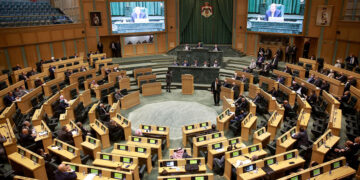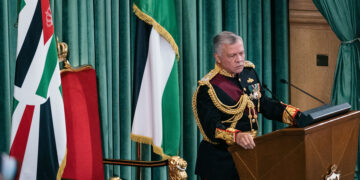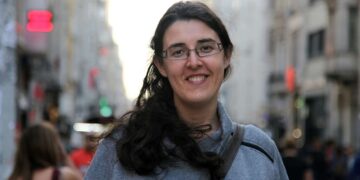As the Acting Advocate General or Acting Public Security Prosecutor, Ahmed al-Dhanhani prosecuted the "UAE 94," including Mohammad al-Roken and Abdulsalam al-Marzouqi, for the peaceful exercise of their rights, which are protected by international law.
Al-Dhanhani disregarded the defendants' allegations of torture, misled many of them to sign false confessions, and refused to grant them access to the case files and documents containing the "evidence" against them until the ninth court session, almost 10 months after their arrest. Soon after the commencement of the trials, he was promoted to the position of Advocate General.
"Al-Dhanhani betrayed his office by punishing victims of government abuse and protecting human rights violators," said Sevag Kechichian, Gulf Researcher at DAWN. "He used his powers of prosecution not to go after criminals but human rights activists and peaceful public figures."
In the high profile case of the "UAE 94," al-Dhanhani enforced prima facie unjust laws that criminalize dissent. He demanded that the court impose the "harshest sentence" on all "UAE 94" defendants. He knew of the defendants' allegations of torture and that they were being held at secret prisons during their pretrial detention. Instead of investigating these violations, he requested the Union Supreme Court to renew the defendants' pretrial detentions, including of al-Roken and al-Marzouqi for six and five months, respectively.
According to court documents, the prosecution, led by al-Dhanhani, built its case largely on "confessions," which many of the defendants claimed were forced and extracted under torture. According to Amnesty International, the prosecution obtained these confessions "from some defendants while they were held in prolonged incommunicado detention at secret locations and were denied access to legal counsel…"
In the "UAE 94" trial's ninth court session, al-Marzooqi told the judge:
I did not expect that even during the interrogations I would be subjected to abuse. I suffer from chronic pain in my spinal discs, and after the arrest, the pain increased due to [the fact that I had been] chained. My hands and feet were cuffed for six hours in the police car. When I got to the prosecution's office, I swear to God that I signed papers without even reading them, and they wrote answers that I didn't say.
In both al-Roken's and al-Marzooqi's cases, and those of others, al-Dhanhani did not provide any evidence justifying the detentions as required by articles 101, 106 and 110 of UAE's law of criminal procedure. In fact, he only allowed the defendants and their lawyers access to the prosecution's "evidence" against them while the trial was well underway. He requested pretrial detention extensions in hearings not all of which were held in the presence of the defendants or their lawyers as stipulated by law. Although Emirati law permits authorities to hold a suspect in detention only for 14 days before charging them with a crime, al-Dhanhani took advantage of a provision that allows prosecutors to ask judges to extend detention for suspects indefinitely.
One of the "UAE 94" defendants told DAWN on June 20, 2021 that on August 8, 2012, al-Dhanhani refused to see the families of al-Roken, al-Marzooqi and others when they inquired about the activists' arrests. Staff in al-Dhanhani's office also refused the families' requests to visit al-Roken, al-Marzooqi and others, or to release them on bail.
In another case, Maryam al-Balushi, an Emirati university student, accused al-Dhanhani of lying to her and misleading her to sign her interrogation documents without letting her see their content. Al-Balushi, who was arrested in May 2015 when she was 19 years old and accused of funding terrorism after she donated $600 US dollars to a Syrian family, was able to record voice messages while in prison on May 29 and November 12, 2018, and November 29, 2019, which were later smuggled outside the prison. She was also able to write down her allegations in a handwritten testimony that was also smuggled outside of the prison. In the handwritten testimony and audio recordings, al-Balushi details the horrors of torture and ill-treatment that she and other women prisoners faced in al-Wathba prison.
In one of the audio recordings, al-Balushi also talks about al-Dhanhani, saying that "I complained to him about the security imprisonment and the fear of hearing the screams of security detainees [due to torture]. He replied that "al-Wathba prison is full of such problems and that you are too young for us to let you stay there." In another part of the recording, al-Balushi says "… I was not presented with an arrest warrant during my arrest. My interrogation continued for three months and … I was then forced to sign documents under pressure, threats, and beatings…"
In her handwritten testimony al-Balushi writes that "Ahmad al-Dhanhani told me when I complained to him of being tortured that torture is forbidden and that I was a victim… and… would be released in six months at the maximum. He then made me sign documents without reading them." The court sentenced al-Balushi to five years in prison and, with the exception of a six-month-period, al-Balushi was kept detained at al-Wathba prison. She attempted to committ suicide four days after starting a hunger trike on February 23, 2020. She remains imprisoned despite finishing serving her sentence on November 19, 2020.
"Ahmed al-Dhanhani lied to suspects and deceived them. He pretended to sympathize with their plight when in fact he couldn't care less about them," said Kechichian. "He should be investigated for the abuse of office and held accountable for the gross and systematic violations he is responsible for in one form or another."
Al-Dhanhani became the Acting Advocate General of State Security in 2009 and served as Advocate General until approximately April 2017. He was elected as chairman of the Forum on Combating the Financing of Terrorism (MENAFATF) on September 1, 2022. He started his career as a prosecutor in the Emirati city of al-Ain, roughly 110 miles east of Abu Dhabi. He was appointed head of the al-Ain prosecutor's office before moving to the al-Sharjah Emirate. According to al-Dhanhani, he contributed to establishing the Khorfakkan prosecutor's office in al-Sharjah, Emirates and remained there until 2009.
Al-Dhanhani received a bachelor's degree in Shari'a and law from the Emirates University in 1996. He also completed a master's degree in "criminal law and money laundering" from the Gulf University in Bahrain in 2008. He later enrolled at Cairo University's doctorate program in criminal law. Al-Dhanhani was born in 1972. He is married and has three sons.
See cases: Mohammed al-Roken and Abdulsalam Darwish al-Marzooqi
***
Tweet the ِEmirati Public Prosecution here and the ِEmirati Embassy in Washington DC here. Tell them to stop prosecuting peaceful dissidents.
About DAWN's culprit gallery:
Tyrants need enablers who will implement their oppressive practices, even if it means abusing their fellow citizens. These agents often mask their complicity in the guise of professionals exercising their duties in offices, courtrooms, police stations, and interrogation rooms.
DAWN seeks to disclose the identity of the state agents who enable repression and to make them recognizable at home and abroad. These individuals, whom DAWN calls "culprits," bear administrative, civil, moral, legal, and/or political responsibility for human rights and international humanitarian law violations.





































